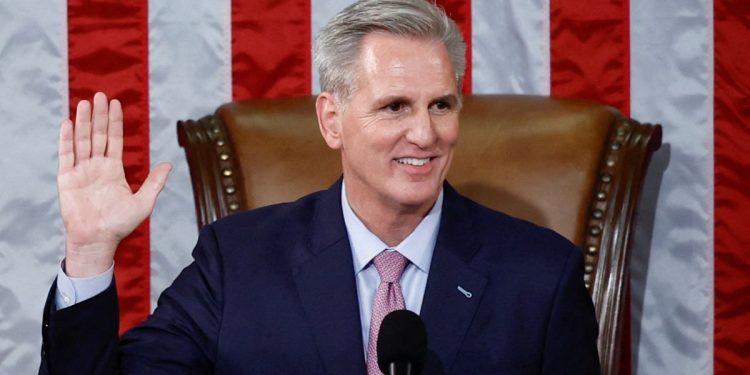Republican Kevin McCarthy’s election as the Speaker of the US House of Representatives after five days of chaotic voting marks the beginning of a new phase of confrontation between the Republicans and Democrats thereby casting a shadow on the functioning of President Joe Biden’s administration. The fear of possible governance paralysis stems from the fact that McCarthy’s elevation was bought with a heavy price conceding major concessions to an ultraconservative bloc of his own party.
House Minority Leader Hakeem Jeffries (D-NY) delivered a rousing speech to the newly-seated House of Representatives in the early hours of Saturday morning.
The chamber had just elected Kevin McCarthy (R-CA) Speaker of the House on the 15th vote held since Tuesday. It was the first time since 1923 that the House failed to elect a speaker on the first ballot.
Hakeem Jeffries told the new Congress that Democrats will put ‘Maturity Over Mar-a-Lago’ in a rousing speech as GOP sat quietly.
The wrangling between McCarthy and the pro-Donald Trump ultra-right Republican Representatives during the past few days prolonged the voting process making the congressional dysfunction the deepest in more than nearly 100 years. The issue was clinched only in the 15th ballot when the obdurate and ultra-conservative Representative Matt Gaetz, accused of being involved in a sex-peddling racket, voted in McCarthy’s favour. When asked by reporters why he eventually changed his mind, Gaetz said it was because he got from McCarthy all the concessions he and his group had demanded. Earlier, Gaetz had been so stubborn in withholding his vote that he almost came to blows with a fellow Republican Mike Rogers who had to be physically pulled away to avoid violence. The whole episode shows the difficulties McCarthy is in all likelihood to face in leading a narrow and deeply polarised majority.
In fact, McCarthy has had a chequered career as a Republican. Considered liberal among the ultra-right Republicans, he had in the past criticised his party’s policies, condemned the attack on the Capitol during the Presidential race between Trump and Biden and even blamed Trump for inciting the mob to resort to violence. Though he changed his position and met Trump the very next day, he is considered by many of the ultra-conservative Republicans as someone “devoid of any ideology” and working in the interests of both sides. This is the reason why the resistance to his elevation by his own party representatives continued so agonizingly. The Republicans’ weaker-than-expected performance in November’s midterm elections left them with a narrow 222-212 majority, which has given a bargaining chip to the radical right-wingers who opposed McCarthy’s leadership.
Typically, McCarthy’s inaugural speech as House Speaker reflected his mindset of juggling with both Republicans and Democrats. He said the country’s “system is built on checks and balances and it is time for us to be a check and provide some balance to the president’s policies.” He also outlined a wide range of priorities for fellow-Republicans to regulate the government’s policies, including cutting spending and immigration.
The chaos witnessed in the past few days of House voting is but a prelude to the highly uncertain path McCarthy will have to tread while trying to lead an unruly Republican majority determined to achieve its priorities and confront President Biden’s agenda at all points. This may even result in shutting down the government which may not get funds approved by the House for running the administration. House Republicans are eager to confront Biden on crucial issues such as the White House’s handling of the US-Mexico border, the COVID-19 crisis and investigations of Biden, his family and his administration. The government will have to restock a military whose supplies have been depleted by decades of war and aid to Ukraine, authorise farming programmes and raise the nation’s borrowing limit to avert an unprecedented federal default.
One-third of seats on the influential rules committee will go to the conservative wing of the party. This is likely to spell danger for the government since this committee clears all legislations prior to allowing them to go to the floor for debate or for a vote.
The desperation to realise his dream of becoming Speaker at any cost is evident from McCarthy’s assertion that the tumultuous voting was “the great part and because it took this long, now we learned how to govern.”
In fact, McCarthy has emerged as a weakened speaker with less authority on paper than his predecessor, Democrat Nancy Pelosi. This is primarily because he conceded a key demand by hard-liners that a single House representative be able to call for his removal at any time. That will sharply compromise his power when trying to pass legislation on critical issues including funding the government, addressing the nation’s looming debt ceiling and other crises that may arise. However, his ideas on ‘check and balances’ are like a breath of fresh air for those who believe in democracy and its current heightened relevance.






































